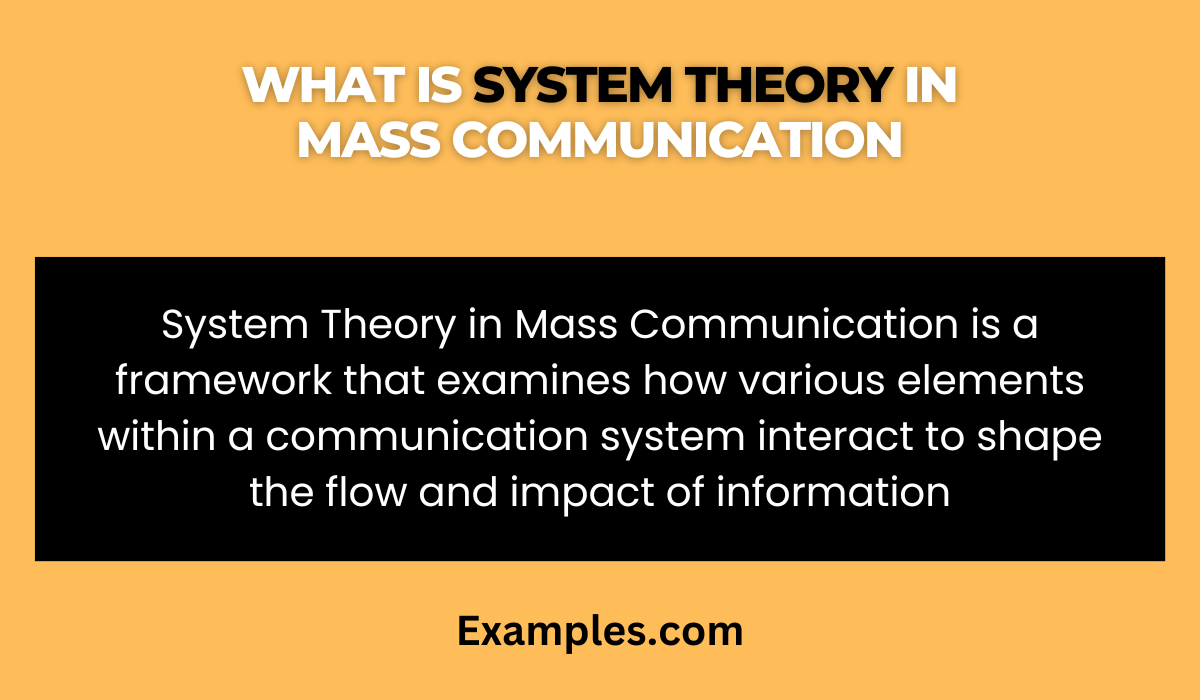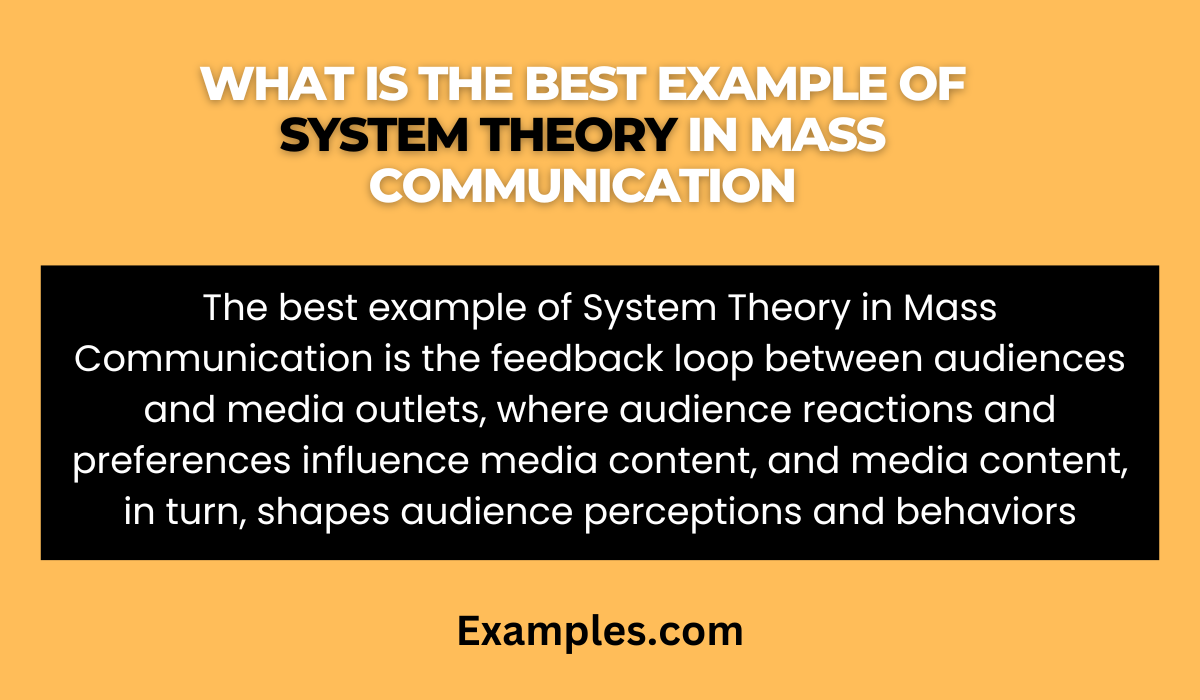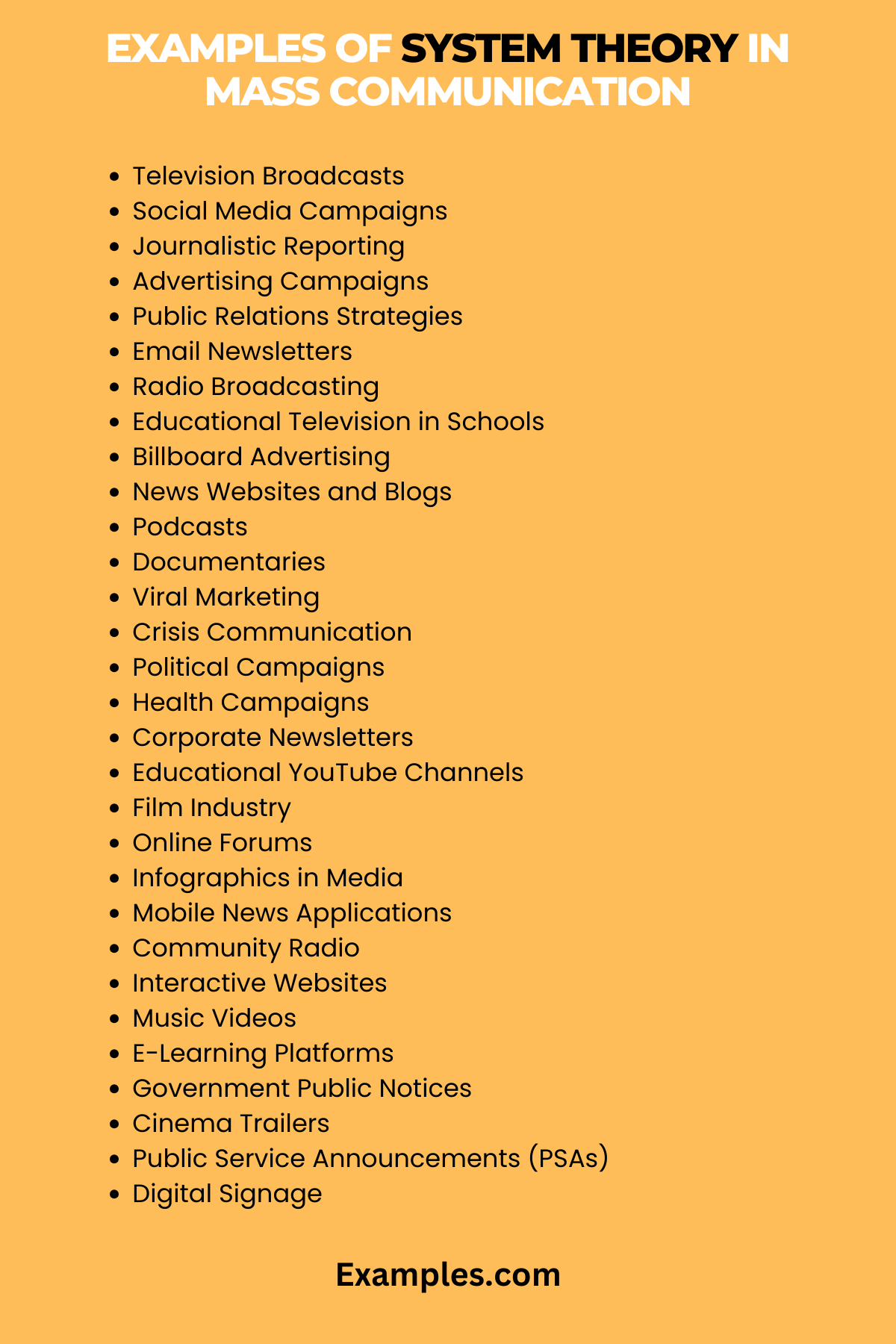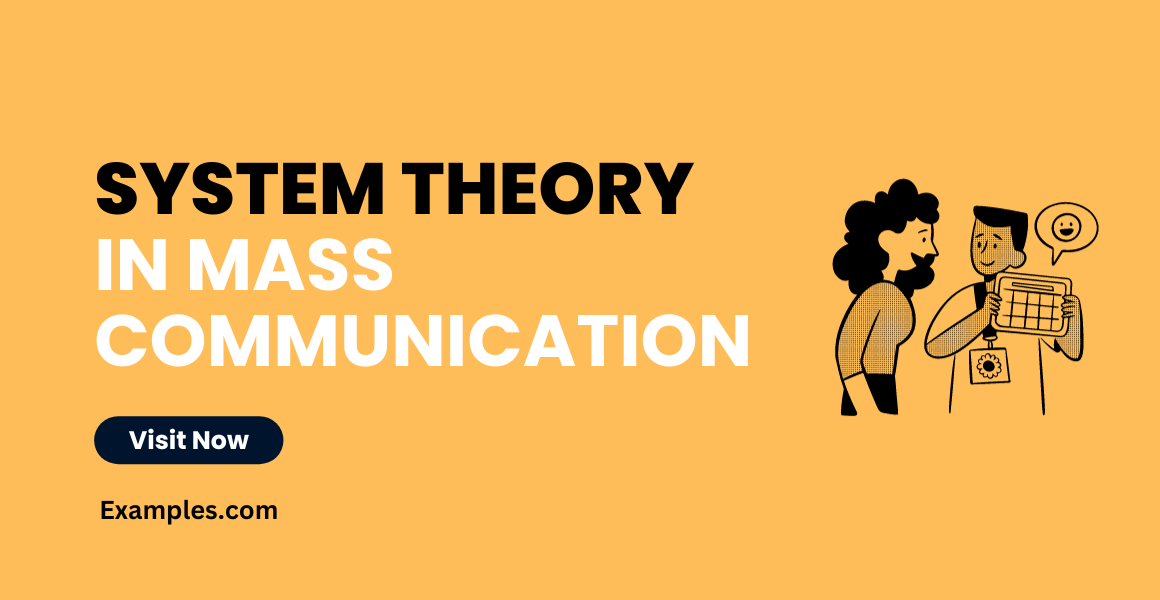29+ System Theory in Mass Communication Examples
System Theory in Mass Communication offers a transformative lens through which we can understand the complex dynamics of communication in today’s interconnected world. It provides a framework for analyzing how information flows, influences, and impacts individuals and society. This guide delves into the nuances of system theory, unveiling its relevance and applications in various mass communication contexts, from journalism to social media, making it an indispensable resource for professionals and enthusiasts alike.
What is System Theory in Mass Communication
System Theory in Mass Communication is an analytical framework that views mass communication as a complex, interconnected system. This theory posits that various elements in the communication process—such as media channels, content creators, and audiences—interact and influence each other within a larger environment. By examining these interactions, system theory helps us understand how messages are crafted, transmitted, and received in the realm of Mass Communication, from traditional media like Broadcasting Mass Communication to digital platforms like Blog Mass Communication. This perspective is crucial for comprehending the multifaceted nature of contemporary communication landscapes.

History of System Theory in Mass Communication
System Theory in Mass Communication has evolved significantly since its inception. Initially developed in the early 20th century, it emerged from the broader field of systems theory, which focuses on understanding complex systems in a holistic way. In the context of mass communication, System Theory was introduced to understand how media messages affect individuals and society. It views mass communication as a complex, interrelated system, where each part influences and is influenced by others.
This theory was particularly influential in shaping the understanding of how media content, audience responses, and societal changes are interconnected. Over the decades, it has been refined to incorporate advancements in technology and media, adapting to changes in how information is disseminated and consumed.
What is the Best Example of System Theory in Mass Communication
System Theory in mass communication can be best exemplified by analyzing the global news network. Here, various elements like news agencies, broadcasters, and the audience interact dynamically. News events are encoded into messages by journalists (Journalism Mass Communication), disseminated through various channels like television or social media (Television Mass Communication, Social media Mass Communication), and decoded by audiences worldwide. This interplay of components showcases the system theory’s applicability in understanding the complexities of global news dissemination and consumption.

30 Examples of System Theory in Mass Communication
System Theory in Mass Communication provides a holistic approach to understanding how various elements in mass communication interact and influence each other. It views mass communication as a complex system comprising different components like media organizations, audiences, messages, and feedback mechanisms. This theory helps in analyzing the dynamic interplay between these components, leading to a deeper comprehension of communication processes.

1. Social Media Platforms: An excellent example of System Theory in action is the use of social media platforms. These platforms act as nodes where information is both generated and consumed, illustrating the interconnectedness of system components. Users act as both senders and receivers, engaging in a continuous exchange of messages, thus influencing the media landscape.
2. Television Broadcasting: The television industry demonstrates System Theory through its operations. The production, distribution, and reception of TV content involve multiple interdependent elements. The audience feedback, through ratings and social media, influences future content creation, showcasing the feedback loop in the system.
3. Public Relations Campaigns: Public Relations (PR) campaigns in Mass Communication utilize System Theory by strategically connecting various elements like media outlets, public opinion, and organizational messaging. These campaigns demonstrate how manipulating one component of the system (media messages) can influence public perception, thus affecting the entire communication system.
4. News Journalism: In news journalism, System Theory is evident in the relationship between journalists, news organizations, sources, and the audience. The process of news gathering, editing, and broadcasting forms a system where each element affects the others. Audience engagement with the news can influence future reporting, highlighting the cyclical nature of the system.
5. Advertising Campaigns: Advertising campaigns in Mass Communication epitomize System Theory through their structured approach to message dissemination. They incorporate feedback mechanisms like market research to tailor messages, demonstrating the interplay between message creation, audience reception, and subsequent communication strategies.
6. Digital News Platforms: Digital news platforms illustrate System Theory by integrating technology, content, and user interaction. These platforms dynamically adapt to user preferences, showcasing how feedback loops influence content curation and presentation in Mass Communication.
7. Podcasting: Podcasting demonstrates System Theory through the interaction of content creators, listeners, and distribution channels. Listener feedback often shapes future episodes, reflecting the system’s responsive and interconnected nature.
8. Film Industry: The film industry is a prime example of System Theory, where production, distribution, audience reception, and critical reviews form an interconnected system. Audience preferences can influence future film projects, highlighting the reciprocal relationship within the system.
9. Online Advertising: Online advertising embodies System Theory, where advertisers, online platforms, and users form a complex communication system. User behavior data influences advertising strategies, showing the continuous interaction and adaptation within the system

10. Educational Broadcasting: Educational broadcasting in schools uses System Theory by integrating educational content, student engagement, and feedback mechanisms. This approach demonstrates how different components of the communication system work together to enhance learning experiences in Mass Communication.
11. Radio Broadcasting: Radio broadcasting showcases System Theory with its blend of content creation, audience interaction, and feedback via call-ins and surveys. This cycle of communication highlights the interconnectedness in Mass Communication.
12. Print Journalism: Print journalism represents System Theory through the interplay of journalists, editors, and readers. Reader responses and sales data influence editorial decisions, demonstrating the system’s feedback loop.
13. Mobile Communication Apps: Mobile communication apps, a facet of Mass Personal Communication, illustrate System Theory. User interactions, app functionality, and real-time feedback create a dynamic communication ecosystem.
14. Corporate Communications: In corporate communications, the interrelation of internal messaging, employee feedback, and external media representation exemplifies System Theory. This interconnected system shapes corporate reputation and stakeholder engagement.
15. Health Communication Campaigns: Health communication campaigns utilize System Theory by linking message creation, public health behaviors, and outcome analysis. The feedback from public response shapes future communication strategies, showing the system’s adaptability.
16. E-Learning Platforms: E-learning platforms in Mass Communication demonstrate System Theory by integrating instructional design, student engagement, and feedback mechanisms. This interconnected system enhances the learning process and content delivery.
17. Political Communication Campaigns: Political campaigns use System Theory by meshing media strategy, public opinion, and political messaging. The feedback from polls and social media impacts future communication tactics, illustrating the dynamic nature of this system.
18. Environmental Awareness Campaigns: These campaigns exemplify System Theory through the coordination of messaging, public response, and media coverage. The interaction between these elements influences public awareness and behavior towards environmental issues.
19. Customer Service Communications: In customer service, System Theory is reflected in the integration of customer feedback, service improvement, and communication channels. This system enhances customer satisfaction and service efficiency.
20. Sports Broadcasting: Sports broadcasting showcases System Theory with the interplay of live events, audience engagement, and media coverage. Audience reactions and ratings influence future broadcasting decisions, demonstrating the system’s responsive nature.

21. Documentary Filmmaking: Documentary filmmaking in Journalism Mass Communication represents System Theory through the relationship between filmmakers, subjects, and viewers. Viewer feedback and critical reception can influence future documentary projects.
22. Music Industry Promotion: The music industry uses System Theory in promoting artists, where fan feedback, media coverage, and marketing strategies form an interconnected communication system.
23. Crisis Communication Management: Crisis communication demonstrates System Theory with the coordination of information dissemination, public response, and media interaction. Effective management of this system is crucial in shaping public perception during a crisis.
24. Influencer Marketing: Influencer marketing in Social Media Mass Communication exemplifies System Theory by integrating influencers, followers, and brand messages. The feedback loop between these elements shapes marketing effectiveness.
25. Cultural Exchange Programs: These programs in Public Relations Mass Communication illustrate System Theory through the exchange of cultural information, participant interaction, and mutual understanding, showcasing a global communication system.
26. Virtual Reality Experiences: Virtual reality in Broadcasting Mass Communication showcases System Theory by merging immersive content, user interaction, and technological advancement. This system offers unique, engaging experiences, influenced by user feedback and technological capabilities.
27. Interactive Gaming: Interactive gaming demonstrates System Theory in Mass Communication through the blend of game design, player engagement, and community feedback. Players’ actions and responses shape the game’s evolution, highlighting the system’s interactivity.
28. Art Exhibitions: Art exhibitions represent System Theory by combining artistic expression, audience interpretation, and curatorial decisions. Feedback from visitors can influence future exhibitions and artist selections, showing the system’s dynamic nature.

29. Book Publishing: In book publishing, System Theory is evident in the relationship between authors, publishers, and readers. Reader trends and feedback influence publishing decisions and future literary trends.
30. Government Public Information Campaigns: These campaigns exemplify System Theory in Mass Communication through the integration of government messaging, media dissemination, and public response. The effectiveness of these campaigns is shaped by how well the system components interact and resonate with the public.
Role of System Theory in Mass Communication
- Definition of System Theory: System Theory in mass communication refers to understanding how media operates as a holistic system. It views mass media outlets as interconnected entities that work together to influence public perception and behavior.
- Interaction of Components: The theory emphasizes the interaction between various components of mass media, such as broadcasting, journalism, and social media, forming a complex network that shapes public discourse.
- Information Flow: System Theory explains how information flows within the mass media system, from content creation to distribution and consumption, highlighting the process of encoding and decoding messages.
- Feedback Mechanism: An integral part of the theory is the feedback mechanism. This involves audiences responding to media messages, which in turn influences future media content, creating a dynamic, interactive system.
- Role in Mass Personal Communication: The theory sheds light on mass personal communication, where mass media tailors content to individual preferences, blurring the lines between mass and personal communication.
- Impact on Public Relations and Advertising: It explains the role of mass communication in shaping public relations and advertising strategies, emphasizing how these fields use media systems to influence public opinion and consumer behavior.
- Media Effects and Theories: System Theory integrates various mass communication theories, like Agenda-Setting and Spiral of Silence, to provide a comprehensive understanding of media effects on society.
- Technological Advancements: It also considers the impact of technological advancements, such as digital and social media, on the evolution of mass communication systems.
- Global Perspective: This theory applies to global mass communication scenarios, understanding how media systems operate and interact on a global scale, influencing international relations and cultural exchange.
- Future Implications: Finally, it addresses the future of mass communication, predicting how emerging technologies and changing societal norms will reshape the media landscape.
Importance of System Theory in Mass Communication
- Holistic Understanding: System Theory offers a comprehensive view of mass communication, emphasizing the interconnectivity between various elements like media channels, content, audience, and societal impact.
- Audience Analysis: It aids in understanding audience behavior and preferences, which is crucial for effective message delivery.
- Media Effectiveness: This theory helps in assessing the effectiveness of different media channels in conveying messages to the target audience.
- Content Development: It guides content creators to tailor their messages for maximum impact, considering the system’s dynamics.
- Feedback Mechanisms: System Theory underscores the importance of feedback in communication, ensuring that media messages are adaptable and responsive.
- Adaptation to Changes: It provides a framework for adapting to technological and societal changes in the field of mass communication.
- Policy Formulation: This theory assists policymakers in understanding the impact of media on society, leading to informed decision-making.
- Crisis Management: In crisis situations, System Theory aids in strategizing effective communication to manage public perception and reaction.
- Ethical Considerations: It brings into focus the ethical implications of mass communication practices.
- Future Trends Prediction: By understanding the system’s dynamics, it enables prediction of future trends in mass communication.
How to use System Theory in Mass Communication
- Strategic Planning: Use System Theory to plan communication strategies that consider all elements of the media system.
- Audience Engagement: Design content that engages diverse audiences, considering feedback mechanisms.
- Media Channel Selection: Choose appropriate channels for message dissemination based on the system’s dynamics.
- Impact Analysis: Analyze the impact of media messages on society, using System Theory as a guide.
- Message Tailoring: Craft messages that are adaptable to different parts of the communication system.
- Crisis Communication: Employ System Theory to manage information flow during crises.
- Feedback Incorporation: Use audience feedback to refine and adjust media messages.
- Innovative Approaches: Develop innovative communication approaches based on a comprehensive understanding of the system.
- Ethical Media Practices: Implement ethical practices in mass communication, guided by the insights from System Theory.
- Future-Proofing: Adapt to future changes in mass communication by understanding and anticipating system evolutions.
System Theory in mass communication offers a holistic framework for understanding the intricate workings of media systems. It underscores the interdependence of various media components, the dynamic flow of information, and the feedback mechanisms within the media landscape. This theory is crucial for comprehending the complex relationships and influences that shape public opinion and societal trends in the digital age.



